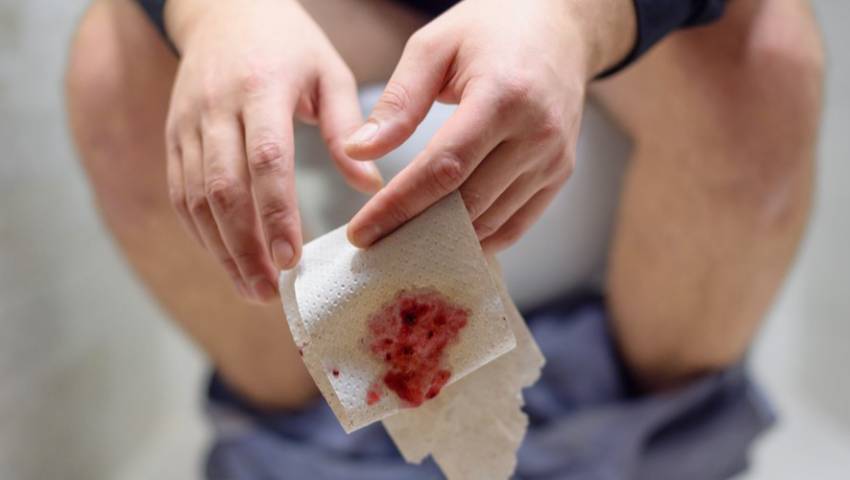Blood in the stool, though frequently alarming, can be a symptom of many beginning health conditions, ranging from minor issues to serious conditions. Understanding the implicit causes, knowing when to seek medical concentration, and executing precautionary measures are vital aspects of managing this symptom. In this complete guide, with insights from Dr. N Subrahmaneswara Babu, a leading Surgical Gastroenterologist in Hyderabad, we’ll explore the common reasons for blood stool, address concerns associated with this symptom, and give practicable tips for prevention.
What can blood in the stool mean for my health?
Blood in the stool, also known as rectal bleeding or hematochezia, can indicate various health effects, ranging from minor to tough. The presence of blood in the coprolite should invariably be estimated by a healthcare professional to determine the carrying cause.
Conditions that may cause blood in stool:
Here is a list of conditions that may cause blood in the stool, as explained by Dr. N Subrahmaneswara Babu:
- Hemorrhoids: Swollen blood vessels in the rectum or anus can conduct bleeding, especially during bowel motions.
- Anal Fissures: Small slits in the anus filling, frequently due to passing hard droppings, can affect bleeding and pain during bowel motions.
- Diverticular Disease: Sacks in the colon wall can grow riled or infected, causing bleeding.
- Inflammatory Bowel complaint( IBD) Conditions like Crohn’s complaint and ulcerative colitis can prompt bleeding, along with symptoms like diarrhea and abdominal pain
- Colorectal Polyps or Cancer: Polyps or cancer in the colon or rectum can cause bleeding, along with changes in bowel patterns and weight loss.
- Gastrointestinal Infections: Infections can beget inflammation and ulcers in the digestive tract, performing in blood in the coprolite.
- Peptic Ulcers: Ulcers in the stomach or small intestine can prompt bleeding, constantly due to factors like. pylori infection or NSAID use.
- Angiodysplasia: Abnormal blood vessels in the gastrointestinal region can affect intermittent bleeding and result in blood in the stool.
These conditions are categorized from relatively benign to more serious and may bear nonidentical diagnostic and medicinal approaches. However, it’s important to consult a healthcare provider for an accurate opinion and applicable treatment, If you witness blood in your stool.
When to Be Worry About Blood in Stool:
Colorectal Surgeon in Hyderabad, Dr.N.S. Babu advises that while noticing blood in your coprolite can be intimidating, it’s pivotal to assess the situation carefully. Here are signs indicating you should seek medical attention:
- Large Amounts of Blood If you observe significant bleeding or bulky blocks in your stool, it’s important to seek medical help immediately.
- Persistent Bleeding Nonstop or recurrent bleeding should be estimated by a healthcare professional.
- Associated Symptoms If you witness more symptoms like austere abdominal pain, unexplained weight loss, fever, or changes in bowel patterns, it’s essential to consult a doctor.
- Dark, Tarry Stools This can indicate bleeding advanced up in the gastrointestinal region and should be investigated instantly.
If you notice any of these signs, don’t hesitate to reach out to your healthcare provider. Ignoring blood in the stool can delay the diagnosis and treatment of underlying conditions.
Prevention Strategies for Blood in Stool:
- Maintain a healthy, fiber-rich diet.
- Stay doused by drinking enough water.
- Engage in regular physical exertion.
- shake straining during bowel motions.
- Respond instantly to the appetite to have a bowel motion.
- Be conservative with drugs that can affect bleeding.
- Follow guidelines for colorectal cancer screening.
Don’t overlook rectal bleeding. Seek expert care from Dr. N Subrahmaneswara Babu, a renowned Gastroenterologist specializing in rectal bleeding treatment in Hyderabad. With over 15+ years of experience, Dr. Babu provides personalized care for gastrointestinal conditions. Book an appointment at EVOKE Clinics or Apollo Hospitals today to begin your journey towards better gastrointestinal health. Your well-being is our top priority.

